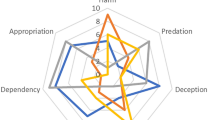Abstract
The purpose of this essay is to suggest that one of the dominant modes of thought in our society is a profound mistrust and misunderstanding of the role of business. A dominant myth in society is that business occupies the moral low ground, separate from ethics or a moral point of view. This position is characterized as the “business sucks” story, and the essay shows how the enactment of this story underlies business thinking among managers and business theorists. The essay concludes with a suggestion to rethink and reinvent this story along more realistic and more empowering lines. Values based capitalism, or stakeholder capitalism, offers a better way to understand the complex role that business does and should play in modern society.
Originally published in: Humanist Manag J, 3, 9–16 © Springer Nature, 2018
Reprint by Springer, https://doi.org/10.1007/s41463-018-0037-y
Access this chapter
Tax calculation will be finalised at checkout
Purchases are for personal use only
Similar content being viewed by others
Notes
- 1.
The “business sucks” story is intended as a further elaboration of what Richard Rorty (1992) called the “America Sucks Sweepstakes” referring to Jonathan Yardley. However, one may refuse to participate in the America sucks sweepstakes and still believe in the business sucks story, as is the case with some modern pragmatists.
- 2.
This section is a direct paraphrase of what John Wisdom considered to be the problem of philosophy (cf. Wisdom (1970: 1–2)). The link between Wisdom’s view of the role of philosophy and Rorty’s notion of “redescription” of self and community is larger than indicated here.
- 3.
- 4.
- 5.
This is the dominant version behind the recent waves of rhetoric on business restructuring and re-engineering where thousands of employees are fired to make things better for “the business”, and ultimately, so the story goes, for society.
- 6.
In today’s world we can see this version of the story behind the current mania of companies to buy back their own shares to pump up the stock price, and the existence of raiders who put good companies into play with no motive other than to profit from the stock.
- 7.
This is precisely Gilbert’s beef in The Twilight of Corporate Strategy (1992), and his more recent Ethics Through Corporate Strategy (1996). Why not just assume that business is one more way that human beings create meaning, and that we are fully human while we are fully engaged in business? We have tried to make this clearer recently in Freeman et al. (2010).
- 8.
It is also related in a complex way to these many recent proposals for the revision of the story of capitalism. With colleagues, Bidhan Parmar and Kirsten Martin, I explore this new story in a forthcoming book tentatively titled: Business: the New Story. A first version of the argument here can be found in Freeman (2017a).
- 9.
I leave these principles as they were in the original. I would state them differently today as I do in Freeman (2017a) note 8 op. cit. and in Freeman et al. (Forthcoming).
- 10.
- 11.
I would put this principle in the context of interdependent stakeholders and the search to avoid making tradeoffs. See Freeman (2017b)
- 12.
And, it is worth noting that values based capitalism has plenty of room for businesses that may suck. Not all values are warm and fuzzy, as Freud and others have taught us.
References
Freeman, R. Edward. 1994. The politics of stakeholder theory: Some future directions. Business Ethics Quarterly 4 (4): 409–421.
———. 2017a. The new story of business: Toward a more responsible capitalism. Business and Society Review 122 (3): 449–465.
———. 2017b. Five challenges to stakeholder theory: A report on research in progress. In Stakeholder Management, Business and Society 360, eds. David M.Wasieleski and James Weber, 1-20. Emerald Publishing Limited.
Freeman, R. Edward, Jeffrey S. Harrison, Andrew C. Wicks, Bidhan L. Parmar, and Simone De Colle. 2010. Stakeholder theory: The state of the art. New York: Cambridge University Press.
Freeman, R. Edward, Bidhan L. Parmar, and Kirsten E. Martin. Forthcoming. Business: The new story (tentatively titled). Columbia University Press.
Gilbert, Daniel. 1992. The twilight of corporate strategy. New York: Oxford University Press.
———. 1996. Ethics through corporate strategy. New York: Oxford University Press.
Harris, Jared D., and R. Edward Freeman. 2008. The impossibility of the separation thesis. Business Ethics Quarterly 18 (4): 541–548.
Howken, Paul. 1983. The next economy. Henry Holt & Co.
Peters, Thomas J., and Robert H. Waterman. 1982. In search of excellence: Lessons from America’s best-run companies. New York: Harper & Row.
Putnam, Hilary. 2004. The collapse of the fact/value dichotomy and other essays. Harvard University Press.
Rorty, Richard. 1992. Trotsky and the wild orchards. Common Knowledge 1 (3): 140–153.
Sen, Amartya. 1987. On ethics and economics. Oxford: Basil Blackwell.
Wicks, Andrew C. 1996. Overcoming the separation thesis: The need for a reconsideration of SIM research. Business and Society 35 (1): 89–118.
Wisdom, A.J.T.D. 1970. The logic of god. In Paradox and discovery. Berkeley: University of California Press.
Author information
Authors and Affiliations
Corresponding author
Editor information
Editors and Affiliations
Rights and permissions
Copyright information
© 2023 Springer Nature Switzerland AG
About this chapter
Cite this chapter
Freeman, R.E. (2023). The “Business Sucks” Story. In: Dmytriyev, S.D., Freeman, R.E. (eds) R. Edward Freeman’s Selected Works on Stakeholder Theory and Business Ethics. Issues in Business Ethics(), vol 53. Springer, Cham. https://doi.org/10.1007/978-3-031-04564-6_28
Download citation
DOI: https://doi.org/10.1007/978-3-031-04564-6_28
Published:
Publisher Name: Springer, Cham
Print ISBN: 978-3-031-04563-9
Online ISBN: 978-3-031-04564-6
eBook Packages: Religion and PhilosophyPhilosophy and Religion (R0)




